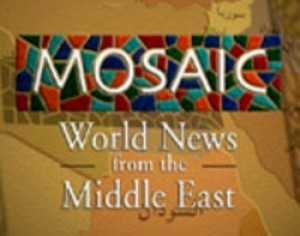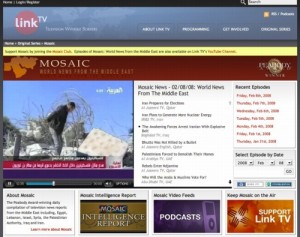(De)Programming the Middle East: A Conversation with Jamal Dajani
If you haven’t seen it before, Mosaic will change the way you think about the Middle East. A thirty-minute daily news report aggregating content from the region’s major television news outlets, this seven-year old program airing on Link TV has skyrocketed in popularity among North American viewers. Why? Because, to paraphrase Jamal Dajani, Mosaic’s producer, his show is helping air a new regional identity which includes both Israeli and Arab voices from throughout the Middle East.
For readers of periodicals like Zeek, who neither speak Arabic or Farsi, nor know how to navigate non-Israeli media from the Mideast, Mosaic gives a profound and incisive look into what many residents of the region think and feel during a time of renewed conflict. Offering up everything from the Israel Broadcast Association’s daily English-language reports to the only regular showing of subtitled Al-Jazeera programming on American television, Mosaic is about as close as you’ll get to hearing all of the relevant players speak for themselves.
A Jerusalem native, Jamal Dajani has made the United States his home since the 1970s. Based in San Francisco, Dajani has been the long-time programmer of Middle Eastern content at the legendary independent cable network Link TV. Now, with this video report, Dajani is rapidly turning into one of the most importance sources for Middle Eastern news in the United States.
Zeek: Last Christmas, National Public Radio’s Eric Westervelt covered a gathering of international graffiti artists in Bethlehem, including the infamous Banksy. They’d congregated in the city in order to help highlight the city’s ongoing plight under Israeli occupation. A colleague said that he was really taken by the fact that NPR would have covered such a unique local event, remarking that the way American media handles the Middle East may be slowly starting to change. Do you see any such difference?
Dajani: We’ve made a dent since we first launched seven years ago. The fact of the matter is that now I get invited on NPR and CNN and the Newshour with Jim Lehrer, and so forth. I’ve been given a platform and a forum to tell American viewers that this is the way it is, that this is what you don’t see on CNN or Fox News. So in that sense, things have changed. Take the war in Iraq. Remember, the first Gulf war was brought to us through the lenses of CNN, but this war was brought to us through the lenses of Al-Jazeera and, at that time, Abu Dhabi TV. Those were the first images. We were ahead of the curve.
Then, months would pass by, and it was back to business as usual, with the media spending a whole month covering Anna Nicole Smith. During that period, I could count hundreds of Iraqis dying. At least 280 Iraqis died during the coverage of Anna Nicole Smith alone. So, to answer your question, I definitely have seen something positive, but also a return to the traditional sensationalism and commercialism and superficiality which we’ve come to associate with [news] coverage.
Zeek: What do you mean exactly by “superficial”?
Dajani: During the war in Lebanon, I barely slept for thirty-three days. I covered it every day, trying to put all of these perspectives together: the Israeli perspective, those of Lebanon’s six different satellite stations, local Arab perspectives, and so forth. So, to watch Anderson Cooper parachuting into Beirut for less than 48 hours and give a very superficial assessment is embarrassing. He didn’t know what he was talking about. He didn’t explain who the conflicting parties were – not just Israel and the Lebanese, but the Shi’ites and the Sunnis. What about the (Lebanese) opposition, and their roles? All of this was missing from American coverage of the conflict.
Zeek: Do you think that Americans understand this problem, and are looking to local Mideastern media like Ha’aretz and Al Jazeera for a potential solution? For example, I know a lot of Americans who turn to The Guardian and The Economist instead of the New York Times and Time for their coverage of the region.
Dajani: A certain segment of American society is definitely doing this – the intelligentsia, the college students. You also have to remember that you and I both live in the San Francisco Bay Area. This is a bubble, separated from the rest of the country. We’ve got universities like Stanford and U.C. Berkeley. We have a lot of learned people living here. But I don’t see this happening in middle America.
Recently, a colleague of mine was talking to a friend who has a Ph.D. in psychology. They were talking about Gaza. Suddenly, the friend asked questions such as “What’s Gaza?” and “Who’s occupying it?” Remember, this person has a doctorate.
This is not an unusual situation. We still have a lot of ignorance to deal with. The clichéd expression that Americans learn their geography through conflicts still exists. We can’t take that for granted. Before the war, Americans never knew about Fallujah. But, because we bombed the hell out of the city, and have a lot of troops there, they now know about it.
Zeek: It’s sad to hear that such things remain true here, but all the same, it’s not completely surprising, either.
Dajani: When you come from a society that perceives itself as an empire, and one that has replaced traditional empires like Great Britain, you develop an attitude similar to that which expects everyone to speak English. You have the perception that everything revolves around your neighborhood. The rest of the world is non-existent, unless it affects you, unless someone declares war on you. Before 9/11, to most Americans, the Arab world was just the place that oil came from. “We buy their gas to fuel our SUVs, how dare they raise their prices.” In terms of awareness, that was about it. (Laughter)
Zeek: In an article you wrote about the rise of Middle Eastern satellite media for the PBS website, you argued that new regional media was creating a new regional identity, in much the same way that Pan Arabism did during the 1950s and 1960s. Yet, unlike that nationalist movement, when I watch Mosaic, I get the sense that for you, Israel is a part of this identity, whereas for followers of Nasser, obviously, it was not.
Dajani: Right now I’m writing a book about the proliferation of satellite television in the Middle East, and its impact on pluralism. Besides Israel, which I call a “Jewish democracy,” we really don’t have democracy in the Middle East. The proliferation of satellite television has started a new movement. Why? Because borders have disappeared. The borders created by the Sykes-Picot Agreement have been penetrated by something called the satellite. And, this was before the Internet. I think the internet’s effect is less important than the satellite, though it will eventually surpass it.
Right now, there are close to 400 satellite television stations that you can receive in the Middle East. It’s amazing. With close to 300 million people, the population of the Middle East is similar to that of the United States. A teeny country like Lebanon is thus a laboratory. It has seven of its own satellite stations. Hezbollah has Al Manar, the Sunnis have Future, the Christian Phalangists have LBC, the Speaker of Parliament, Nabih Berri, has his own. It’s crazy. Everyone wants to broadcast their message, not only locally, but regionally and even internationally.
Zeek: It changes how we define what’s local.
Dajani: Yes, exactly. Imagine yourself sitting in Rabat, Morocco and you’re watching Egyptian television, and yet you’re getting your news from Qatar. The story is happening in Ramallah or in Gaza, but the program you’re watching about it is coming from Qatar. This has created a revolution, because it has erased national boundaries. These boundaries should not just be understood in terms of conflict. Now, you can get blow-by-blow accounts of whatever is going on, for example, in Iraq.
Zeek: How does this differ from the ways in which people in the region received their news in the past?
Dajani: For years, Arab governments and dictators had managed to control the media and information. From Gamal Abdel Nasser’s control of Sawt al-Arab(The Voice of the Arabs) to the Hashemite King of Jordan, they all created channels, from radio to television, which, beginning in the early 1960s, were used as tools to disseminate propaganda, to show you their protocol news. You’d spend hours hearing about how this king met with this foreign minister. You might have something brewing, in terms of a revolution, in a place like Syria, but the public would never know about it. They’d never be given any clue about what was going on. The rest of the programming was entertainment. So, in essence, news was just a tool for governments.
The birth of Al-Jazeera was thus monumental. It transformed the entire landscape because it forced these government-controlled channels to change their behavior. And, it really took them by surprise. Abu Dhabi television took a 180-degree turn in the way that it covered the news. Even Jordan Television, which was totally controlled by the government, and exclusively focused on King Hussein and his family, now covers other things. Just the other day, for example, on Jordanian TV, I saw coverage of Jordanians speaking out against their government’s handling of the economy. They were showing footage of protestors marching in the street, and so forth. This is what’s been going on, and it’s all due to the birth of satellite television.
Zeek: It’s remarkable. During the mid-seventies, when I was a child, I can only remember getting two Israeli radio stations – Kol Yisrael and Voice of Peace - while the rest of the dial was populated by bellicose Arab government stations, of course only broadcasting in Arabic. If we wanted comprehensive news, we turned to our shortwave, and listened to the BBC. There was even less to choose from on TV.
Dajani: During the war in Lebanon, I published an article in the San Francisco Chronicle about spending the 1967 war huddled around my grandmother’s shortwave radio in Jerusalem, in what she called her “radio room.” The radio dial was set on Sawt al Arab, and we’d be receiving false reports. Report #72, the Egyptian Army was repelling the Zionist enemy…. They made it sound like they were winning the war.
Because I went to a French Catholic school, and was studying French and English, I would listen to the BBC. And, with my ten-year-old’s knowledge of English, I found a difference between what we were hearing on the Egyptian station and what was being said on the BBC, and I would tell my grandmother “No, they’re saying the opposite.” My grandmother would look at me stone-faced and say, “How can we believe the Brits?” because she’d lived under British colonial rule during the Mandate period.
Zeek: For so many years, in Israel, this was the stereotype of pretty much all Arab media. It was hyperbolic, and trafficked in falsehoods. Now, the ironic thing is that last year we saw Al-Jazeera English replacing the BBC on Yes, one of Israel’s largest cable providers.
Dajani: Right. Don’t forget that during the war in Lebanon, Channel 10 was buying a lot of its footage from Al-Jazeera, and that a lot of Israelis were watching Al-Jazeera because the IBA (Israel Broadcasting Authority) was being censored. So if you were curious, and wanted to know where [Hezbollah’s] rockets were actually landing, you had to watch Al-Jazeera. Many Israelis that I spoke to were watching it even before the advent of Al-Jazeera English, despite the fact that they did not understand Arabic. And, if they did, Israelis could see there was a difference. I interviewed several Israelis, who told me this was the case.
Zeek: It’s going to be interesting to see what kind of impact the new Arab media has on Israeli media. One certainly can see examples of Israeli newspapers paying close attention to it. In 2006, I remember seeing on Ha’aretz’ English website, a reprint from Dar-Al-Hayat. I was surprised. Their correspondents also tend to source out of al-Sharq al-Awsat with some degree of frequency.
Dajani: Right. It’s also reciprocal, at least for the Palestinians. With the population still living under occupation, think of how many newspapers are operating in the West Bank and Gaza. Think about how many consume Arabic Israeli media, and are also fluent in Hebrew. They read Ha’aretz and Yediot Ahronot, and so forth.
Zeek: Yes, both newspapers have substantial Arab readerships.
Dajani: This has had a major impact on Palestinians, encouraging them to go to their editors and say, “They (Israel) are not censoring there. Why are you censoring here? When Arafat and Abu Mazen tried to censor the media, they had demonstrations in Ramallah because Palestinians would not put up with it. In other countries, such as Morocco, you might not have such boldness, but they can now see what’s happening next door.
Zeek: In terms of Western media, how do you respond to the charge that the Europeans never commission balanced Middle Eastern coverage, because they are more predisposed towards Arab concerns?
Dajani: I don’t think that’s true. I read British media, and watch France’s TV 5 on a regular basis. I can see the difference in coverage on the Arab-Israeli front, on the Iraqi front daily. Compared to the BBC to CNN, or Deutsche Welle, which we air here [at Link TV] and they’re light years ahead of the American media. But are they more Arab-friendly? Yes and no. Sometimes France’s TV 5 will go out of their way to be pro-Israel in their coverage.
American media can be more “pro-Israel” than Israeli media. Though it may be taboo here to criticize, let’s say, Ehud Olmert, if you open up an issue of Ha’aretz, every day you’ll find his nose getting rubbed to the ground. Or, for that matter anything to do with corruption, mistakes made by the Israeli government, or the war in Lebanon. But, if you switch to Fox News, you’ll find them trying to be more Israeli than Israelis are themselves.
Zeek: I think American right-wingers are sensitive to this disjuncture, too. Andrea Levin, the head of CAMERA, has been extremely critical of Israeli media as of late, especially Ha’aretz.
Dajani: Yes, and it’s very strange, because Israeli media is a healthy media, where you can have a center and you can have a left, and you can have a right. Just look at the country’s main papers: Jerusalem Post, Yediot Ahronot and Ha’aretz. They’re available to everyone. If you want to read Ha’aretz, its there. If you want to read Yediot Ahronot or the Jerusalem Post, they’re there. And they are all different. They offer different perspectives and different influences. This is how media should be.
![[the current issue of ZEEK]](../../image/2/100/0/5/uploads/leftistethicistgraphic-52842c6a.png)
- 5000 Pages of Zeek
- Founded in 2001, Zeek was the first Jewish online magazine, and we have over 5000 pages online to prove it, all available free of charge. Read more in the Archive.
More articles by
Joel Schalit
More articles in
Arts and Culture
- Euphoria, Curiosity, Exile & the Ongoing Journey of a Hasidic Rebel: A Q & A with Shulem Deen
- Poet Q, Poet A: Jews Are Funny! Six Poets on Jewish Humor, Poetry & Activism and Survival
- Tackling Hate Speech With Textiles: Robin Atlas in New York for Tu B’Shvat
- Fiction: Angels Out of America
- When Is an Acceptance Speech Really a Speech About Acceptance?




